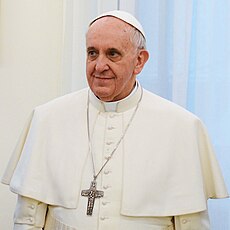 You can’t tell too much from one interview, of course, but the interview Pope Francis gave an Italian Jesuit journal last month , and which was released last week, seems like a blockbuster. Everyone understands this. Progressive Catholics are elated. After long years in the wilderness, they believe, they have one of their own as pope. Traditionalists have been more circumspect, but it’s hard to miss the sense of alienation. Traditionalists are used to thinking that, however much they have to battle with progressives at the local level, the pope has their back. Now, that’s very unclear.
You can’t tell too much from one interview, of course, but the interview Pope Francis gave an Italian Jesuit journal last month , and which was released last week, seems like a blockbuster. Everyone understands this. Progressive Catholics are elated. After long years in the wilderness, they believe, they have one of their own as pope. Traditionalists have been more circumspect, but it’s hard to miss the sense of alienation. Traditionalists are used to thinking that, however much they have to battle with progressives at the local level, the pope has their back. Now, that’s very unclear.
As an outsider, I don’t feel right getting involved in intra-Catholic debates. There’s too much I don’t know, and anyway it’s not polite. But this interview does suggest three observations. First, Pope Francis has a definite vision for the Catholic Church. When he gave his airborne interview on the way back from Brazil last month–the interview in which he famously said, “who am I to judge?”—some traditionalists consoled themselves that he had spoken off the cuff or allowed himself to be misunderstood. After this interview, it’s impossible to think so. He knows what he means and means what he says.
Second, I’m not sure the pope is correct to suggest that the Church has been obsessing over sexuality—abortion, gay marriage, contraception. Catholic friends tell me they almost never hear sermons on these subjects. One might say, with justification, that the wider society is obsessing about these issues and the Church is only responding. If the government adopts a new rule that says you must pay for your employees’ contraceptives and abortifacients, and you think such drugs are gravely wrong as a matter of conscience, what should you do? I suppose you could readjust your priorities and say nothing. But if you were to object to such a rule, you would hardly be “obsessing.”
Third, it’s striking that in a long interview the pope said virtually nothing about politics. Only twice did he refer to the Church’s position on public policy questions, once to state that the Church should stop talking so much about sexuality and once to refer to the proper approach to “social issues”:
When it comes to social issues, it is one thing to have a meeting to study the problem of drugs in a slum neighborhood and quite another thing to go there, live there and understand the problem from the inside and study it. There is a brilliant letter by Father Arrupe to the Centers for Social Research and Action on poverty, in which he says clearly that one cannot speak of poverty if one does not experience poverty, with a direct connection to the places in which there is poverty. The word insertion is dangerous because some religious have taken it as a fad, and disasters have occurred because of a lack of discernment. But it is truly important.
Note a couple of things here. For Pope Francis, the phrase “social issues” connotes what Americans would call “economic issues”–an interesting distinction. More important, to address these issues, Pope Francis did not call for political action. He did not say, “When it comes to social issues, the important thing is to redistribute wealth and nationalize health care.” He may favor such programs, I don’t know. But he apparently does not think political programs are terribly important. The essential thing is for the Church to live among poor people, to share their lives, to minister to them–in order to witness to the Gospel.
In other words, Pope Francis’ interview does not suggest he would like the Catholic Church to adopt a “progressive” politics any more than a “conservative” politics. It suggests he thinks the Church is beyond politics. To me, this is the key take-away from the pope’s interview. There is an old, old debate in Christianity. Is the faith about healing souls or social justice? It’s about both, of course, but which is more important? If I read him correctly, Pope Francis leans strongly in the first direction: Christianity is an interior matter, a question of salvation, of walking humbly in the company of the Lord and his followers. Christians can never be completely beyond politics, of course, and it will be interesting to see how this all develops. But Pope Francis seems, in his way, a mystic. And mystics don’t do politics.
